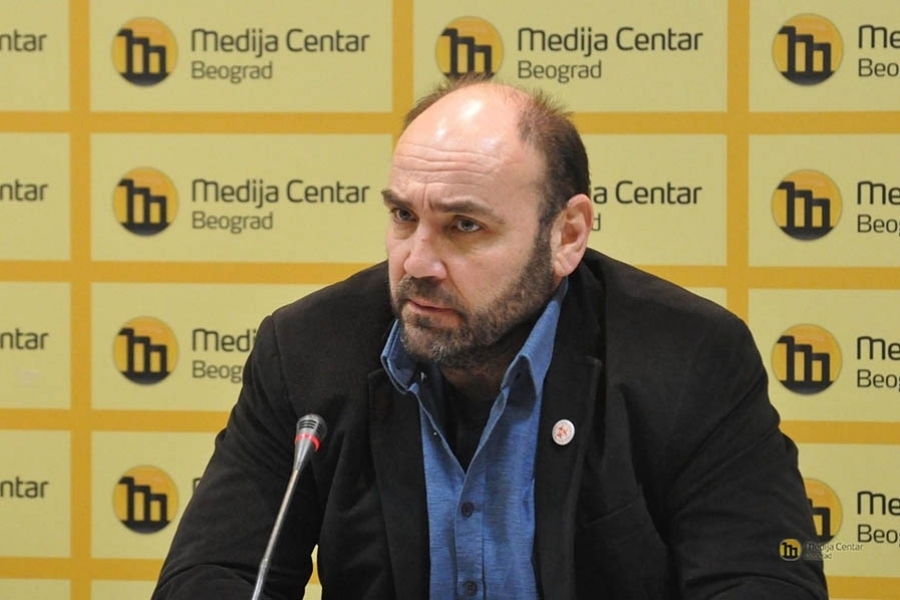Zoran Panovic: On many television channels, its not visible that people are protesting, or its interpreted in an entirely different context... The media situation is crucial for free elections. Our society is facing serious dilemmas and confusion, and if we have elections, it must be in a form of a serious debate on the fundamental issues of this society - where are we going, what do we want, what is our stance on Kosovo, rather than it being another media distraction about who will gain how many seats. That is simply a wrong path, emphasized Panovic.

Zoran Panovic: On many television channels, its not visible that people are protesting, or its interpreted in an entirely different context... The media situation is crucial for free elections. Our society is facing serious dilemmas and confusion, and if we have elections, it must be in a form of a serious debate on the fundamental issues of this society - where are we going, what do we want, what is our stance on Kosovo, rather than it being another media distraction about who will gain how many seats. That is simply a wrong path, emphasized Panovic.

N1 and Nova S are cable television stations, not national frequency television stations. These things cannot be compared. These two television stations are influential, but its meaningless to compare the significance of cable television with those on national frequency. Its silly to talk about who has dominance and who doesnt," said Zoran Panovic, the program director of Demostat, during his appearance on the "Jutro" morning show on TV Prva on September 9th. Despite the hosts repeated claims that protests "can be seen on many television channels," he emphasized that the media situation in Serbia is not good, and "we know what professionalism in reporting means."
"On many television channels, its not visible that people are protesting, or its interpreted in an entirely different context... The media situation is crucial for free elections. Our society is facing serious dilemmas and confusion, and if we have elections, it must be in a form of a serious debate on the fundamental issues of this society - where are we going, what do we want, what is our stance on Kosovo, rather than it being another media distraction about who will gain how many seats. That is simply a wrong path," Panovic emphasized.
According to Panovic, the legitimacy of the Serbian Progressive Partys government is "most relevant in Belgrade," and "the question of legitimacy is a question that bothers President Vucic, and he probably wants the government to be reaffirmed by electoral will."
The Serbian Progressive Party (SNS) has succeeded in marginalizing all other coalition partners over the years and making them irrelevant, even though it adopted some of their issues. The problem with the opposition is that there are more people against this government than those who vote for the opposition. The opposition needs to articulate the dissatisfaction of the citizens, which is difficult to do without organized political parties," said Zoran Panovic, commenting on the possibility of holding early parliamentary elections, which would likely coincide with the city assembly elections in Belgrade.
Panovi? also mentioned one of the problems of the opposition, which is its inability to control elections at many polling stations, while "SNS is a capillary party; they have their organizations down to almost every local community."
"SNS is very strong on the ground; its a well-oiled machine. This capillarity is good for organization, but at the same time, it often leads to equating the party and the state. Vucic has created his form of statism, which often equates the party and the state, so the fact that someone is for or against the opposition is not important; whats essential is the acceptance of the opposition as one of the fundamental institutions of the system... There is no democratic system without opposition, and SNS is trying to portray the opposition as an anti-system category, as traitors... Vucic calls the current opposition remnants of the former regime, yet he has taken half of the people from that former regime into his government," he noted.
Panovic questioned whether Vucics legitimacy as the president of the country would remain unquestioned "if they were to organize only local elections, and SNS loses, for example, 15 cities."
"Do you think Vucic would remain the President of Serbia if SNS lost parliamentary elections... Imagine cohabitation with Vucic as president and a prime minister from the ranks of the pro-European opposition, or a coalition of opposition cities and Ana Brnabics government. I cant imagine it... SNS is not so internally stable; their conflicts are subdued, they are fought behind the scenes, and they all then refer to the leader," said the program director of Demostat.
Panovic emphasized that the entrance of the opposition into parliament after last years elections "further exposed the government." In this context, he proposed that sessions of the National Assembly should be broadcast on the First channel of RTS (Radio Television of Serbia) instead of RTS 2.
"I dont understand why the sessions of the Assembly are not broadcast on the First channel of RTS; I dont know whats better than that," he noted.
The program director of Demostat concluded that we should follow the example of countries in the region like Montenegro and Croatia, not only in terms of economic growth but also in terms of electoral standards.
Zoran Panovic assessed that the only chance for the opposition to win the upcoming parliamentary elections is for "everyone to unite, but first, it needs to be determined who constitutes the opposition." He stated, "We have parties in power, center parties, and parties to the left of center, while on the right, there is a great deal of confusion about who is who and who supports whom... The question is whether Vucic has a control package of actions on the right; I believe he does."
In all societies there are issues that are rather being skipped. Certain...
The neoliberal path, started in 2001, has led to especially bad results in Serbi...
For centuries, the region was subsumed within the Ottoman and Hungarian Empires,...
"Serbia has returned to the systemic and anti-systemic position of the political...
In reality, Serbia is closer than ever to NATO. In the course of the last five y...